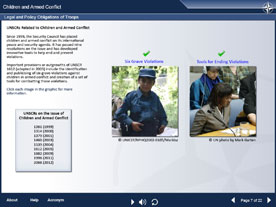NATO and the United Nations launch a training module on Children and Armed Conflict
NATO and the United Nations (UN) are working together to protect children affected by conflict. On 26 June, during a visit to NATO Headquarters by Leila Zerrougui, the Special Representative of the UN Secretary-General for Children and Armed Conflict, NATO launched a comprehensive and innovative e-learning course.

Mrs Leila Zerrougui, the Special Representative of the UN Secretary-General for Children and Armed Conflict and NATO Assistant Secretary General for Operations Stephen Evans
This training is a comprehensive course designed to increase knowledge on children affected by armed conflict and ensure that NATO troops are better prepared to prevent violations and to assist in reducing the effects of armed conflict on children.
“Our experience working with the United Nations to address the protection of children in conflict areas like Afghanistan has been very positive,” said Assistant Secretary General Stephen Evans, the NATO Focal Point on Children and Armed Conflict.
“The training module that Allied Command Transformation has developed jointly with the UN is a tangible demonstration of our close cooperation. I am very happy to join Mrs Zerrougui in launching the training module,” he added.
The evolving character and tactics of contemporary warfare create unprecedented threats for children. They are recruited by armed forces and armed groups, become the victims of indiscriminate attacks or are subjected to sexual violence. Schools and hospitals come under fire and are subject to other deliberate attacks.
“The growing involvement of regional organisations in conflict mediation, peacekeeping operations and peace enforcement missions highlights the importance of joining our efforts to promote adequate protection for children affected by conflict,” said Leila Zerrougui.

Pre-deployment training
The new training package will help troops who are preparing for deployment on operations. It will stress the importance of upholding conduct of military operations. Emphasis will be placed on mechanisms to detect potential risks to children. Attention will be paid to the proper procedures for dealing with children associated with armed groups.
In her briefing to the Operations Policy Committee, Zerrougui welcomed NATO’s efforts to implement in its operations UN Security Council Resolution 1612, which put in place a monitoring and reporting mechanism of grave violations committed against children.
Zerrougui was in particular pleased to hear about the initiatives taken by the International Security Assistance Force (ISAF) in Afghanistan to address children’s rights violations through support for public information campaigns, training for the Afghan National Security Forces and enhanced reporting mechanisms.
